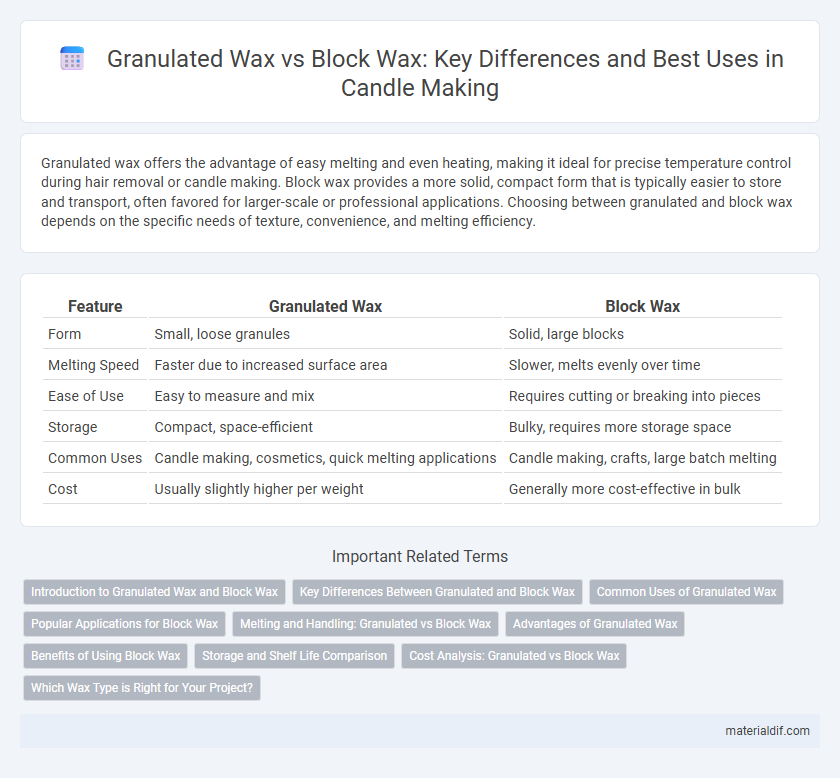Granulated wax offers the advantage of easy melting and even heating, making it ideal for precise temperature control during hair removal or candle making. Block wax provides a more solid, compact form that is typically easier to store and transport, often favored for larger-scale or professional applications. Choosing between granulated and block wax depends on the specific needs of texture, convenience, and melting efficiency.
Table of Comparison
| Feature | Granulated Wax | Block Wax |
|---|---|---|
| Form | Small, loose granules | Solid, large blocks |
| Melting Speed | Faster due to increased surface area | Slower, melts evenly over time |
| Ease of Use | Easy to measure and mix | Requires cutting or breaking into pieces |
| Storage | Compact, space-efficient | Bulky, requires more storage space |
| Common Uses | Candle making, cosmetics, quick melting applications | Candle making, crafts, large batch melting |
| Cost | Usually slightly higher per weight | Generally more cost-effective in bulk |
Introduction to Granulated Wax and Block Wax
Granulated wax consists of small, loose pellets designed for easy melting and precise application, making it ideal for hair removal treatments and candle making. Block wax is a solid, compact form that provides a consistent, long-lasting melt suitable for larger projects or professional use. Both types offer unique benefits based on user preference, with granulated wax allowing for more control and block wax delivering durability and economy.
Key Differences Between Granulated and Block Wax
Granulated wax consists of small, loose beads that melt faster and provide easier application, making it ideal for precise and controlled waxing sessions. Block wax comes in solid form, offering longer melt time and is better suited for large surface areas or bulk use in salons. The key differences revolve around application ease, melting speed, and preferred usage scenarios in professional versus home waxing.
Common Uses of Granulated Wax
Granulated wax is commonly used in candle making, cosmetics, and hair removal due to its easy melting properties and precise measurement capabilities. Its small, uniform particles allow for quick and even melting, which is ideal for blending with fragrances and dyes in cosmetic formulations. Compared to block wax, granulated wax offers greater versatility and control in applications requiring consistent texture and smooth finishes.
Popular Applications for Block Wax
Block wax is widely used in dental laboratories for creating precise dental molds and bite registrations due to its firm texture and easy carving properties. It is favored in jewelry making for crafting detailed wax models that are later cast into metal. The stability and consistency of block wax make it suitable for sculpting and specialty mold-making in various industrial applications.
Melting and Handling: Granulated vs Block Wax
Granulated wax melts faster and more evenly due to its small, uniformly sized particles, allowing for precise temperature control and quicker melting times compared to block wax. Block wax requires longer heating and more frequent stirring to achieve a consistent melt, which can increase the risk of overheating and uneven texture. Handling granulated wax offers improved convenience and efficiency, especially in professional waxing settings where time and consistency are critical.
Advantages of Granulated Wax
Granulated wax offers superior ease of use and precise application compared to block wax, allowing for quicker melting and better temperature control during waxing sessions. Its small granule form promotes even heating, reducing the risk of overheating or burning the wax, which enhances safety and comfort. The convenient packaging of granulated wax also minimizes waste and simplifies storage, making it a preferred choice for professional salons and home use.
Benefits of Using Block Wax
Block wax offers superior durability and longer-lasting performance compared to granulated wax, making it ideal for heavy-duty applications. Its solid form reduces waste and simplifies storage, enhancing convenience and cost efficiency for users. The compact structure ensures consistent melting and precise application, improving overall effectiveness in waxing processes.
Storage and Shelf Life Comparison
Granulated wax offers easier storage in airtight containers due to its smaller, uniform particles that reduce exposure to air and moisture, extending its shelf life up to 3 years when stored properly. Block wax requires more space and is prone to surface degradation if not sealed tightly, typically maintaining its quality for about 1 to 2 years. Optimal storage for both involves cool, dry environments away from direct sunlight to prevent melting and discoloration.
Cost Analysis: Granulated vs Block Wax
Granulated wax generally incurs higher production and packaging costs compared to block wax due to its processed form and smaller granule units. Block wax offers a more cost-effective option by minimizing manufacturing complexity and reducing transportation expenses through compact, solid shapes. Businesses often choose block wax for large-scale applications to optimize budget efficiency while granulated wax suits detailed, smaller-scale uses despite its higher price point.
Which Wax Type is Right for Your Project?
Granulated wax offers superior melting control and quick integration, making it ideal for intricate molds and detailed craft projects where precision is crucial. Block wax provides consistency and ease of handling, preferred for larger-scale applications like candle making or sculpting that demand uniform texture and shape. Selecting between granulated and block wax depends on the project scale, required melting speed, and desired outcome quality.
Granulated wax vs Block wax Infographic

 materialdif.com
materialdif.com